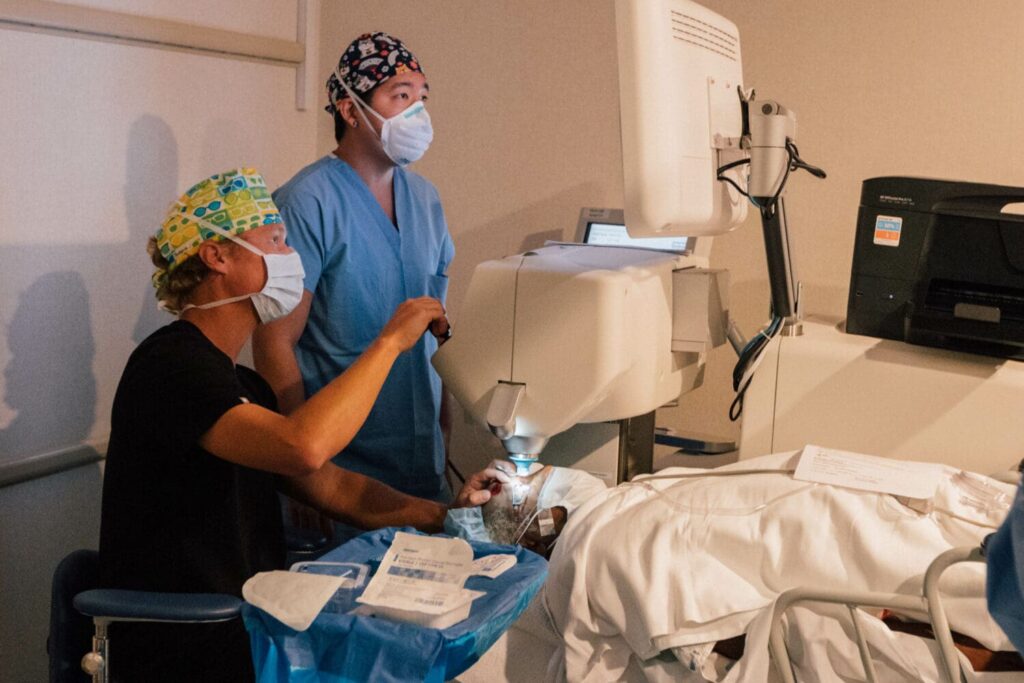LASIK surgery is a popular procedure for correcting vision problems, such as nearsightedness, farsightedness, and astigmatism. If you are considering LASIK surgery, it is important to understand what the procedure entails, how to prepare for it, and what to expect during the recovery process. This comprehensive guide will provide you with all the information you need to make an informed decision about LASIK surgery.
Understanding LASIK Surgery
The room where surgery LASIK takes place is meticulously designed to maintain a sterile environment. The surgical team will be wearing specialized attire, including surgical masks and gloves, to ensure the highest standards of cleanliness and safety.
The Basics of LASIK
LASIK, which stands for Laser-Assisted In Situ Keratomileusis, is a revolutionary surgical procedure that has transformed the field of vision correction. This procedure utilizes a precise laser to reshape the cornea, the transparent front part of the eye, to correct refractive errors such as nearsightedness, farsightedness, and astigmatism. By reshaping the cornea, LASIK surgery can significantly improve vision and reduce or eliminate the need for glasses or contact lenses.
The procedure is known for its efficiency and effectiveness, typically lasting only about 15 minutes per eye. Patients often report immediate improvements in their vision post-surgery, with optimal results continuing to enhance over the following days and weeks as the eye heals and adjusts to its new shape.
It is important to note that LASIK is a safe and commonly performed outpatient procedure, with millions of successful surgeries conducted worldwide. The high success rate and minimal discomfort associated with LASIK have made it a popular choice for individuals seeking freedom from visual aids.

Who is a Good Candidate for LASIK?
While LASIK offers life-changing benefits, not everyone is an ideal candidate for this procedure. To determine suitability, a comprehensive eye examination by a qualified ophthalmologist is essential. Generally, individuals who make good candidates for LASIK:
- Have maintained a stable prescription for at least 1 year
- Are over the age of 18, as younger individuals may still be experiencing changes in their vision
- Possess healthy eyes with no underlying eye conditions or diseases that could affect healing
- Have realistic expectations about the outcomes and limitations of LASIK surgery
If you meet these criteria and are looking to enhance your quality of life through improved vision, LASIK surgery may be a suitable option worth considering.
Preparing for LASIK Surgery
Initial Consultation and Eye Examination
The first step in preparing for LASIK surgery is to schedule an initial consultation with a qualified LASIK surgeon. During this consultation, your eye doctor will perform a detailed eye examination to assess your eye health and determine if LASIK is right for you.
This examination may include tests such as corneal thickness measurement, pupil dilation, and corneal mapping. These tests help the surgeon create a personalized treatment plan for your specific needs. Learn more about corneal thickness measurement on https://www.aao.org/education/bcscsnippetdetail.aspx?id=ea227ea3-5fa9-40d9-8f0c-7b2a3838c4c6
It’s essential to be open and honest during this consultation, discussing any past eye conditions, current medications, and lifestyle factors that may impact the surgery’s success. The surgeon will also explain the potential risks and benefits of LASIK, ensuring you have a clear understanding of what to expect.
Steps to Take Before Your Surgery
Before your LASIK surgery, your surgeon will provide you with specific instructions to ensure the best possible outcome. These instructions may include:
- Discontinuing the use of contact lenses for a specified period before the surgery
- Avoiding the use of eye makeup and creams on the day of the surgery
- Arranging for transportation to and from the surgical center, as you may not be able to drive yourself
Following these instructions carefully will help minimize any potential risks and ensure a successful surgery.
Additionally, it’s important to have a support system in place for after the surgery. You may experience temporary vision changes and discomfort, so having someone to assist you with daily tasks for the first few days can be beneficial. Your surgeon will provide post-operative care instructions to help you navigate the recovery process smoothly.
The LASIK Procedure: Step by Step
What Happens During LASIK Surgery?
During LASIK surgery, you will be positioned comfortably on a reclining chair. The surgeon will administer local anesthesia to numb your eyes and provide additional eye drops to keep them moist during the procedure.
The doctor will then create a corneal flap using a microkeratome or a femtosecond laser. This flap is lifted to expose the underlying corneal tissue, and a laser is used to reshape the cornea based on the pre-determined treatment plan. The flap is then repositioned, acting as a natural bandage.
Patients often express amazement at the speed and precision of the laser used during the procedure. The excimer laser, a key component of LASIK surgery, emits a cool ultraviolet light beam that removes microscopic amounts of tissue with extraordinary accuracy.
The Role of the Surgeon and the LASIK Equipment
During the surgery, the role of the surgeon is crucial. The surgeon guides the laser and monitors the procedure to ensure precise and accurate corneal reshaping.
Modern LASIK equipment utilizes advanced technology, such as eye tracking systems and wavefront technology, to enhance safety and precision. These technological advancements have significantly improved the outcomes of LASIK surgery. To learn more about wavefront technology click here.
Throughout the procedure, the surgical team will ensure your comfort and safety, answering any questions or concerns you may have.
Post-Surgery Expectations and Recovery
Immediate Aftercare and Recovery Period
Immediately after LASIK surgery, your eyes may feel a bit irritated, as if there is something in them. This is normal and should subside within a few hours. You may also experience temporary fluctuations in your vision, which will improve gradually.
Your surgeon will provide you with detailed aftercare instructions, which may include using prescribed eye drops, avoiding rubbing your eyes, and wearing protective eyewear during sleep. It is crucial to follow these instructions to ensure proper healing and minimize the risk of complications.
During the immediate recovery period, it is common to experience some sensitivity to light and mild discomfort. Your eyes may also water more than usual, and you may notice some dryness or itchiness. These symptoms are normal and should gradually improve as your eyes heal.
It is important to attend all scheduled follow-up appointments with your eye doctor to monitor your progress and address any concerns you may have during the recovery process. Your doctor will evaluate your eyes and make sure they are healing properly, providing you with peace of mind and reassurance.
Long-Term Vision Changes and Adjustments
Most patients experience significant improvements in their vision following LASIK surgery. However, it is important to note that your vision may continue to change over time, especially as you age. This is a natural part of the aging process and not a result of the LASIK surgery itself.
In some cases, patients may require additional vision correction procedures or the use of glasses for certain activities, such as reading or driving at night. Your eye doctor will monitor your vision and provide guidance on any necessary adjustments.
It is essential to maintain regular eye exams even after LASIK surgery to ensure that your vision remains stable and healthy. Your eye doctor will be able to detect any changes in your vision early on and recommend appropriate treatments or interventions to address them effectively.
Remember that while LASIK can provide long-lasting vision correction for many individuals, it is essential to be realistic about the potential for changes in your vision over time. By staying informed and proactive about your eye health, you can continue to enjoy clear vision and optimal eye function for years to come.
Potential Risks and Complications of LASIK
Common Side Effects and How to Manage Them
While LASIK surgery is generally safe and successful, there are potential risks and complications associated with any surgical procedure. It’s important to be aware of these possibilities so you can make an informed decision about whether LASIK is right for you.
Some common side effects of LASIK include dry eyes, glare, halos, and temporary visual disturbances. These side effects are usually temporary and can be managed with the use of prescribed eye drops and medications. Your surgeon will provide you with detailed instructions on how to properly use these medications to alleviate any discomfort you may experience.
In addition to using eye drops, there are other self-care measures you can take to manage these side effects. For example, wearing sunglasses when outdoors can help reduce glare and protect your eyes from harmful UV rays. Using artificial tears can also help alleviate dryness and provide relief.

When to Seek Medical Attention After LASIK
While rare, LASIK surgery may result in more serious complications. It’s important to be aware of the warning signs and seek immediate medical attention if you experience any of the following:
- Severe or worsening pain in your eyes
- Significant vision loss or changes
- Increased redness, swelling, or discharge from your eyes
If you notice any of these symptoms, do not hesitate to contact your surgeon. They will provide you with emergency contact information and instructions on how to proceed in case of any complications.
It’s worth noting that while these risks exist, LASIK surgery has a high success rate and has helped millions of people achieve clearer vision. Your surgeon will thoroughly evaluate your eyes and discuss any potential risks specific to your situation during your consultation.
Now that you have a better understanding of what to expect from LASIK surgery, you can confidently explore this vision correction option with your eye doctor. Remember to ask any additional questions or concerns you may have during your consultations to ensure you are fully informed about the procedure and its potential outcomes. Good luck on your journey to improved vision!
At the end of the day, the decision to undergo LASIK surgery is a personal one. By weighing the potential risks against the benefits, and by having open and honest conversations with your surgeon, you can make an informed choice that is right for you and your vision needs.



